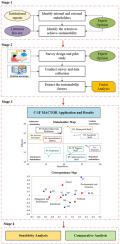Who drives sustainability in distance education? A novel multi-stakeholder analysis using factor analysis and fuzzy MACTOR
IF 10
1区 环境科学与生态学
Q1 ENGINEERING, ENVIRONMENTAL
引用次数: 0
Abstract
Distance education (DE) has become a core component of higher education institutions, particularly in response to rapid digital transformation and global sustainability goals. In this perspective, identifying sustainability dimensions, understanding stakeholder roles, and the interrelationships between them are essential for the long-term success of DE. This study addresses the research gap concerning the stakeholder-driven sustainability of DE by proposing a novel hybrid multi-criteria decision-making (MCDM) approach. This approach, which integrates factor analysis (FA) and the Matrix of Alliances and Conflicts: Tactics, Objectives and Recommendations (MACTOR) method enhanced with circular intuitionistic fuzzy sets (C-IFSs), explores stakeholder interrelationships and their impact on sustainability factors. Based on survey data collected from 92 higher education institutions, five sustainability factors were extracted. Using the C-IFS-enhanced MACTOR method, the impact and roles of nine stakeholders on the sustainability factors are obtained, addressing the uncertainty in assessments. The findings indicate that institutional factors are the most important, followed by environmental-economic and pedagogical-psychological factors. Managerial staff, higher education institutions, and accreditation bodies lead institutional sustainability; administrative staff and service providers underpin environmental-economic sustainability; and students and academic staff drive pedagogical-psychological sustainability. To validate the robustness and reliability of the proposed approach, sensitivity and comparative analyses are conducted. The proposed approach contributes to stakeholder analysis under uncertainty and offers practical insights for decision-makers involved in the sustainable implementation of DE.

谁在推动远程教育的可持续性?基于因子分析和模糊MACTOR的多利益相关者分析
远程教育(DE)已成为高等教育机构的核心组成部分,特别是在应对快速数字化转型和全球可持续发展目标方面。从这个角度来看,确定可持续发展的维度,理解利益相关者的角色,以及它们之间的相互关系,对于可持续发展的长期成功至关重要。本研究通过提出一种新的混合多标准决策(MCDM)方法,解决了有关利益相关者驱动的可持续发展的研究空白。该方法整合了因子分析(FA)和联盟与冲突矩阵:策略、目标和建议(MACTOR)方法,并辅以循环直觉模糊集(c - ifs),探讨了利益相关者之间的相互关系及其对可持续性因素的影响。基于92所高等教育机构的调查数据,提取了5个可持续性因素。利用c - ifs增强的MACTOR方法,获得了九个利益相关者对可持续性因素的影响和作用,解决了评估中的不确定性。结果表明,制度因素是最重要的,其次是环境-经济因素和教育-心理因素。管理人员、高等教育机构和认证机构领导机构的可持续性;行政人员和服务提供者是环境经济可持续性的基础;学生和教职员工推动着教学心理的可持续性。为了验证该方法的鲁棒性和可靠性,进行了灵敏度分析和比较分析。提出的方法有助于不确定性下的利益相关者分析,并为参与可持续DE实施的决策者提供实用见解。
本文章由计算机程序翻译,如有差异,请以英文原文为准。
求助全文
约1分钟内获得全文
求助全文
来源期刊

Journal of Cleaner Production
环境科学-工程:环境
CiteScore
20.40
自引率
9.00%
发文量
4720
审稿时长
111 days
期刊介绍:
The Journal of Cleaner Production is an international, transdisciplinary journal that addresses and discusses theoretical and practical Cleaner Production, Environmental, and Sustainability issues. It aims to help societies become more sustainable by focusing on the concept of 'Cleaner Production', which aims at preventing waste production and increasing efficiencies in energy, water, resources, and human capital use. The journal serves as a platform for corporations, governments, education institutions, regions, and societies to engage in discussions and research related to Cleaner Production, environmental, and sustainability practices.
 求助内容:
求助内容: 应助结果提醒方式:
应助结果提醒方式:


